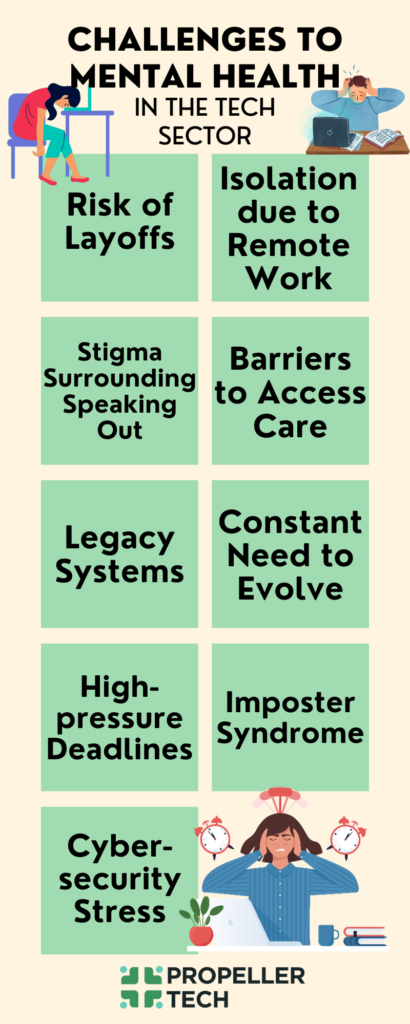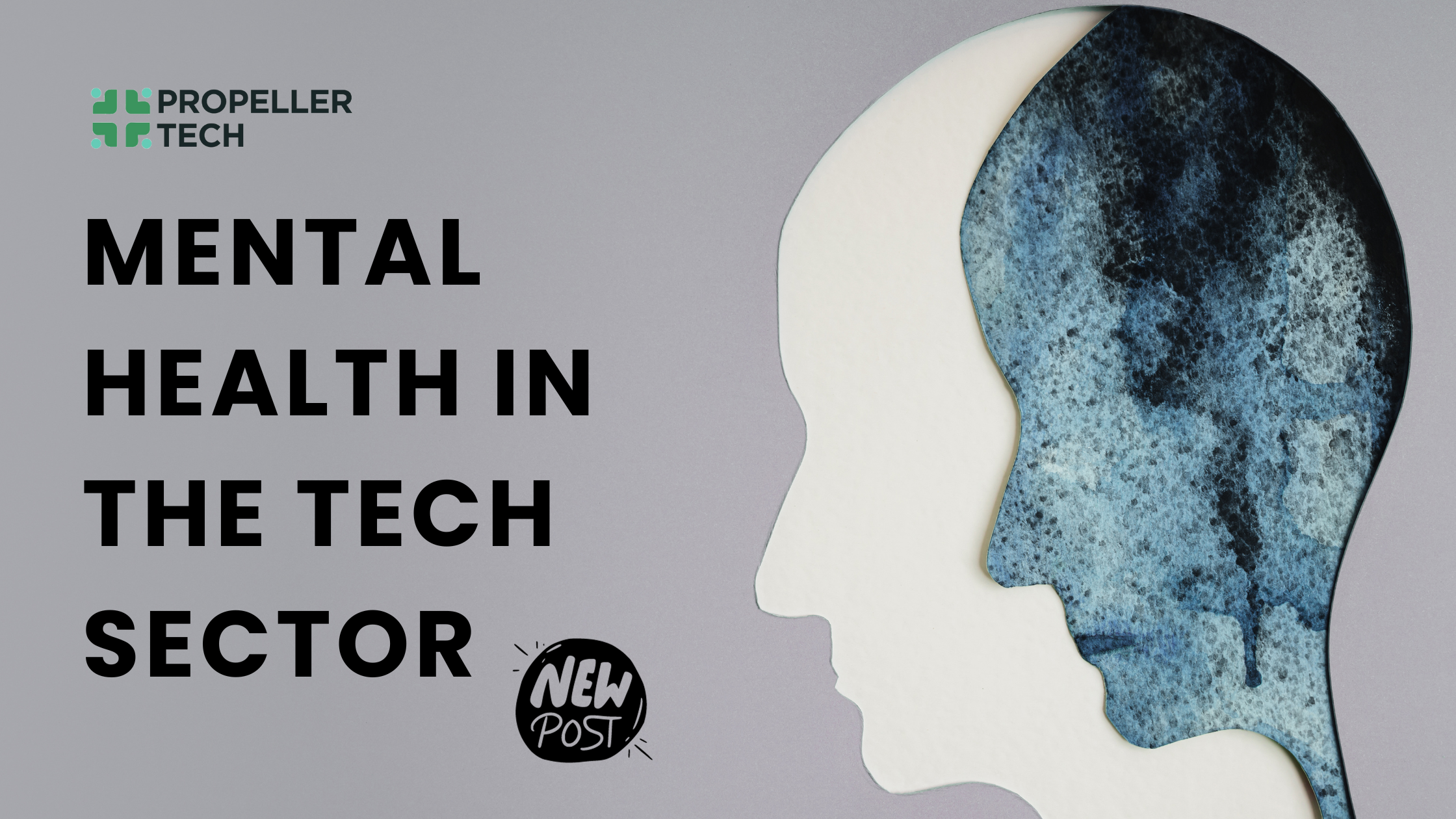The theme for this year’s World Mental Health Day, is “Mental Health is a Universal Human Right.” While this theme may seem self-evident, the reality is that mental health is often overlooked, given its invisible nature, and can even be perceived as a sign of weakness when discussed openly. This issue is particularly relevant in the technology sector, where small to medium-sized companies are prevalent, processes are evolving, and dedicated HR/People Departments may be lacking.
Just as a physical injury like a broken leg or fractured collarbone demands attention and support, employees or colleagues dealing with anxiety, depression, or ADHD deserve the same level of support to perform their roles effectively and happily.
And let’s face it, many of us have personally experienced or are currently experiencing challenging times with our emotional and mental state…and that’s ok!
It is, therefore, crucial for employers and colleagues in the technology sector to recognise the significance of mental health in the workplace and take proactive steps to create a supportive environment for those facing mental health challenges.
The Impact of Work on Mental Health
Interestingly, work can have a dual role in relation to mental health—it can either protect or jeopardise it.
Positive aspects of having a job are:-
- Sense of Belonging: Employment provides individuals with a sense of belonging to a team, which can alleviate feelings of isolation.
- Daily Structure and Meaning: Work offers daily structure and meaningful experiences, as observed by Karen Jacob, PhD, in her work with individuals with borderline personality disorder.
- Utilization of Strengths: People with mental health challenges can leverage their strengths, care for others, and contribute to meaningful projects, fostering feelings of altruism.
- Boost to Confidence: Work can boost self-confidence and provide a sense of purpose and meaning in life.
Karen Jacob suggests embracing the concept of ‘unconditional positive regard,’ as coined by Carl Rogers, the Father of Person-Centred Therapy. This approach encourages cultivating a supportive and non-judgmental attitude toward colleagues. Instead of seeking to change others, we should work together to foster an environment of understanding, where support is offered during both highs and lows, successes and ‘failures’. Such awareness promotes personal and professional growth while ensuring work expectations are met in a more supportive manner.
However, there can often be a darker side to work:-
- Excessive Workload: Jobs that demand more than what is outlined in the job description or for which employees are inadequately trained can lead to stress, burnout, and a sense of failure.
- Work-Related Stressors: Uncertain work conditions, irregular hours, inflexibility, job insecurity, unclear career opportunities, and unclear job descriptions can contribute to anxiety and other mental health issues.
- Toxic Work Environment: Instances of violence, harassment, bullying, discrimination, and exclusion can lead to unhappiness at work, exacerbating stress and severe emotional and mental health problems.
Therefore, employers and managers in the technology sector must shoulder a duty of care and legal responsibility regarding mental health at work. Prioritising mental well-being is not only a moral imperative but also a sound business decision.
Benefits of Supporting Mental Health in the Technology Sector
Studies indicate that companies that actively support their employees’ mental health enjoy numerous benefits:
- Increased Employee Engagement: Companies that prioritise mental health witness improved employee engagement levels, countering the trend of declining engagement in many workplaces.
- Enhanced Productivity: Addressing mental health issues reduces absenteeism and boosts productivity. In 2022, the Health and Safety Executive reported 7.3 million working days lost due to work-related ill health, primarily stemming from stress, depression, anxiety, or musculoskeletal disorders.
- Lower Employee Turnover: Employees facing mental health challenges are less likely to leave a job when their well-being is supported. Research by the Executive Development Network found that 86% of employees are more likely to leave a job if it doesn’t support their well-being.
- Improved Safety: Employees with sound mental health are more likely to adhere to safety protocols, contributing to a safer work environment.
- Enhanced Cognitive Performance: Depression can hinder physical job tasks by approximately 20% and reduce cognitive performance by about 35%.
- Attracting Top Talent: In a competitive job market, offering mental health support and policies can make your company more appealing to candidates. According to Deloitte’s Gen Z and Millennial Survey, 80% of Gen Zs consider mental health support when evaluating potential employers.
 Challenges to Mental Health in the Technology Sector
Challenges to Mental Health in the Technology Sector
The technology sector, like any industry, has specific factors that can contribute to poor mental health if unmanaged:
- Risk of Layoffs: In the technology sector, the risk of layoffs can be a constant concern. Employees may face job insecurity and anxiety about their future, impacting their mental well-being.
- Isolation due to Remote Work: With the prevalence of remote work in the technology sector, employees may experience isolation and a lack of social interaction, which can lead to feelings of loneliness and detachment from the workplace community.
- Stigma Surrounding Speaking Out: Despite advancements in mental health awareness, stigma can still exist in the tech industry. Employees may hesitate to speak out about their mental health challenges due to fears of discrimination or being perceived as less capable.
- Barriers to Access Care: While technology professionals are often adept at finding information online, navigating the complexities of accessing mental health care can still be challenging. Factors such as high healthcare costs or limited access to mental health professionals can act as barriers to seeking help, even once they have made the decision to speak out about it. This can be even more detrimental to a person’s mental well-being.
- Legacy Systems: Dealing with outdated and inefficient legacy systems in the technology sector can be frustrating and stressful. This constant struggle with outdated technology can contribute to feelings of job dissatisfaction and exacerbate mental health issues.
- Constant Need to Evolve: The tech industry’s rapid pace of innovation requires employees to constantly adapt and evolve their skill sets. This pressure to stay up-to-date and competitive in a rapidly changing field can lead to high levels of stress and burnout.
- High-pressure Deadlines: The tech industry often operates on tight project timelines and release schedules. The constant pressure to meet deadlines can lead to stress and anxiety among tech professionals.
- Impostor Syndrome: Many tech workers, despite their skills and qualifications, struggle with impostor syndrome, a feeling of inadequacy and self-doubt. This can negatively impact their mental well-being.
- Cybersecurity Stress: Professionals in cybersecurity roles deal with the stress of protecting sensitive data and networks from cyber threats, which can be emotionally taxing.
Steps for Improvement in the Technology Sector
To enhance employee mental health and support in the technology sector, we encourage employers of all shapes and sizes to consider these steps. They might not all be possible depending on where you are, but some are relatively simple and easy things to do and will make the world of change for you and your employees, and ultimately your business. According to Forbes.com there is ‘a strong return on investment for employee mental health and well-being – on average, a return of $5.30 for every $1 spent.
- Establish a Supportive Culture:
- Promote a workplace culture that values mental health, encourages open communication, and destigmatises seeking help when needed. Create an atmosphere where employees feel safe discussing their challenges and seeking support.
- Provide Resources and Support:
- Offer mental health resources such as Employee Assistance Programs (EAPs), counselling services, and access to mental health professionals. Ensure that employees are aware of these resources and how to access them.
- Encourage Work-Life Balance:
- Promote work-life balance by setting clear boundaries for work hours and encouraging employees to take breaks. Avoid expecting employees to be available 24/7, which can lead to burnout.
- Feedback and Open Communication:
- Encourage regular feedback and establish an open-door policy. Allow employees to express their concerns and provide feedback anonymously if needed. Creating a safe space for dialogue can help identify and address issues early on.
- Foster Social Connections:
- Organise team-building activities, social events, and opportunities for employees to connect on a personal level. Building strong social bonds can combat feelings of isolation and enhance mental well-being.
- Digital Mental Health Solutions:
- Leverage digital technology to provide personalised mental health support. Implement apps or platforms that offer mental health resources, self-help tools, and digital therapy options for employees e.g. Oliva Health, OpenUp, Headspace, Proem Behavioral Health and Unmind.
- Well-Defined Job Descriptions:
- Ensure job descriptions are clear and aligned with the actual responsibilities and expectations. Unclear roles can contribute to stress and anxiety.
- Promote Diversity and Inclusion:
- Embrace diversity and inclusion initiatives to create a more equitable workplace. Ensure that all employees, regardless of background, feel valued and included, reducing the risk of discrimination-related stress.
By implementing these processes and methods, tech employers and co-workers can contribute to a healthier and more supportive work environment, ultimately alleviating the burden on mental health in the tech sector.
In conclusion, World Mental Health Day 2023 serves as a reminder that mental health is a universal right. It calls for action to break the silence, destigmatise mental health discussions, and establish working environments where everyone can thrive.

